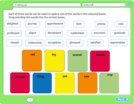Formal writing and the subjunctive mood
Add to My Folder
Specialist tutor and freelance educational writer
Helping children to vary their writing style and tone to suit different purposes and audiences is a key part of writing development. This can begin with providing engaging writing opportunities for emergent writers in Early Years, to being taught to adopt a more formal tone when the situation requires, as they progress through KS2.

The National Curriculum includes references to learning ‘the conventions of different types of writing’ throughout KS2. By Year 6, children working at the expected level should be able to select ‘vocabulary and grammatical structures that reflect the level of formality required mostly correctly’ and beyond the expected level, one of the key extra criteria is ‘managing shifts between levels of formality through selecting vocabulary precisely and by manipulating grammatical structures’ (taken from the Interim Assessment Framework).
How can teachers help children to achieve this?
- Firstly, identify when a more formal style is needed.
- Get children to ask themselves the following: Do you know your audience? How well? (An unknown audience and/or writing to someone important usually means using a more formal style.)
- What is the purpose of your writing? (Often persuading someone of a serious argument or conveying important information requires a more formal tone.)
- Reading examples of similar types of writing is the best way to help children ‘hear’ how formal writing sounds.
- Give children some ‘real’ writing opportunities where formal writing is required, such as:
- Letters – of application, complaint, which inform (for example, to parents)
- News reports
- Articles for a public forum (for example, a school website)
- Factual pieces aimed at an unspecified or adult audience (for example, an encyclopaedia entry)
- Persuasive speeches
- Instructions for a product
Scholastic Resource Bank: Primary - join today!
- Over 6,000 primary activities, lesson ideas and resources
- Perfect for anyone working with children from 5 to 11 years old
- Unlimited access from just £1.25 per month
Already a member? Sign in below.
Published 12 April 2016
Reviews
You need to be signed in to place a review.



